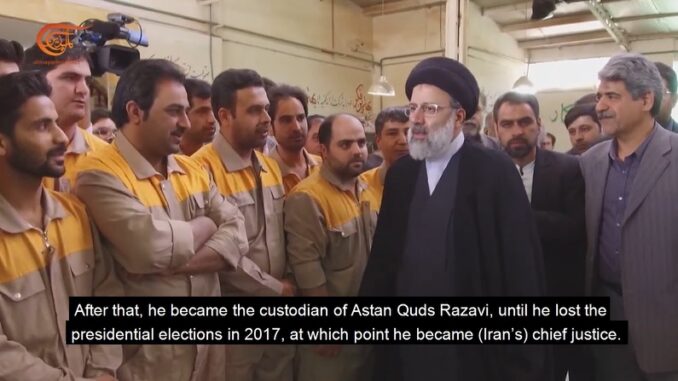
Description:
A short documentary by Al Mayadeen TV on the rise of President Ibrahim Raisi and whether his election will bring a major change to Iran’s strategy in the Middle East and the world.
We are translating and publishing this documentary as four parts. This is Part Two.
Watch Part One here
Source: Al Mayadeen Documentaries (YouTube)
Date: August 7, 2021
( Please help us keep producing independent translations for you by contributing a small monthly amount here)
Transcript:
(Part 2 start)
Raisi:
We were watching the people (of the nation) – who were from different political movements – working effectively and actively in the field, listening to the messages and directives of their Imam and leader (Khomeini), offering everything they have in terms of money, lives and children, undergoing all the various trials and participating in all the various movements and sacrificing their lives. This forms an important and essential element of the victory of our revolution and its renaissance.
Reporter:
(Raisi) then returned to Tehran and was engrossed in his job as the capital’s deputy prosecutor. During those years, confronting the anti-government armed groups had become a complex matter, as the Islamic Republic was preoccupied with Iraq on the battlefronts, while the (Iranian) people were facing the attacks of the armed groups in the alleyways and markets. 17,000 people, civilians and members of the revolutionary forces were killed by these armed groups.
At the end of the Iran-Iraq war, in the summer of 1988, the military forces of the People’s Mojahedin Organization of Iran (PMOI), the largest armed group opposed to the Islamic Republic, attacked the western borders of the country. After four days of fierce resistance, the People’s Mojahedin Organization suffered a heavy defeat. Several days later, Ayatollah Khomeini, the then leader of the Islamic Revolution, issued a letter with instructions on appointing three judges whose mission was to study and handle the prisoner files of opposition groups. According to available reports, there was coordination between (Evin) Prison and the PMOI, to carry out riots in Evin Prison and prisons in other cities in conjunction with the attack on the west of the country.
During the following days, and in view of the (country’s) warlike atmosphere that hung over the meeting sessions and the examination of (various prisoner) cases, the committee formed by Imam (Khomeini) recommended the execution of some prisoners who were members of opposition groups. The name of Ibrahim Raisi was not mentioned in Imam Khomeini’s letter (to form the committee), but later some opponents of the Islamic Republic tried to attach his name to the aforementioned committee formed by the Imam. This claim has not been proven correct till now.
Raisi:
I told The Institute for Compilation and Publication of Imam Khomeini’s Works that the Imam’s views and opinions should be published from a jurisprudential point of view and should be made clear to the people. They should not touch on the outcome of his decisions at all, but rather clarify the jurisprudential foundations on which the Imam ruled.
We believe that the way our great Imam (Khomeini) dealt with this hypocritical movement (i.e. PMOI) led to bringing about safety for this country from these hypocrites forever. This decision that the Imam made himself was appreciated. Therefore, future generations should be grateful to our late Imam. However, some individuals who believe that the end justifies the means are trying to convince people that a number of prisoners were innocent, or that their mistakes and sins were not great. Whether handed down in the Court of First Instance or later in the Supreme Court, the sentences regarding the prisoners in 1988 were given in accordance with both Sharia and the law. However, these individuals wanted to settle scores with me personally. If you go back to the Imam’s letter, you will find that the three people (he assigned) were: the public prosecutor, the Chief Justice and the Secretary of the Supreme National Security Council. Where was I among these people? I was the deputy prosecutor. In short, they wish to settle scores with the Imam, the Revolution and the establishment.
Reporter:
Raisi held the position of Prosecutor General of the capital, Tehran, until 1992. After that, he held the position of the President of the General Inspection Organization (GIO) of Iran. He remained in this position during the presidencies of Rafsanjani and Khatami, supervising and evaluating matters during the governments (of these) two (figures). Later, during the tenures of the late Ayatollah Hashemi Shahroudi and Ayatollah Amoli Larijani respectively, Raisi became the first deputy chief justice and then became the country’s public prosecutor.
After that, he became the custodian of Astan Quds Razavi, until he lost the presidential elections in 2017, at which point he became (Iran’s) chief justice.
With regards to his standing within internal politics, even though Raisi is a conservative, or a principlist, he is known for his moderation. Because of his judicial status, his focus is justice. During his stay in the city of Mashhad as the Custodian of Astan Quds Razavi, one of the largest non-profit religious institutions in Iran, he carried out welfare projects, such as building houses for the deprived and marginalised, and being present in crisis and disaster areas such as (those affected by) floods and earthquakes in Iran.
When he was appointed as chief justice of Iran in 2017 by the Leader of the Islamic Revolution Ayatollah Khamenei, the issue of judicial justice became high on his agenda. In fact, Raisi has visited more provinces in the country than any chief justice. He sat with the people and listened to them.
(Part 2 end)
Subscribe to our mailing list!

Leave a Reply